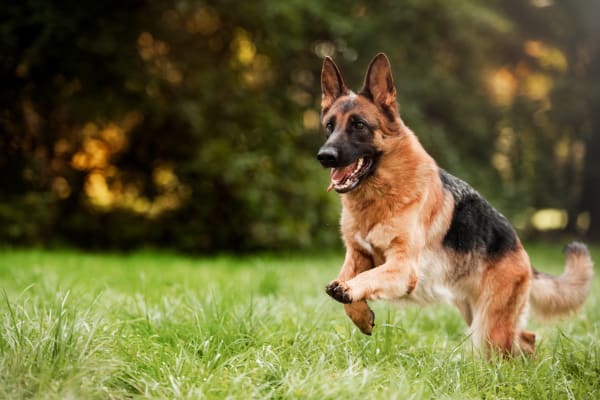Common Dog Knee Injuries
Cruciate ligament tears and luxating patellas are two common knee injuries for dogs. A fair number of worried pup parents bring their dogs in for these reasons every year. As you might imagine, these injuries cause dogs significant pain - and concern from their families.
Cruciate Ligament Tears
Cruciate ligaments are pairs of ligaments that connect your dog’s thigh bone and shin bone. They are arranged similar to a letter ‘X’ and like the ACL ligament in humans, they can tear and cause significant pain (and subsequent limping) for your pet.
A torn CCL (Cranial cruciate ligament) is a common dog knee injury, and surgery on this joint is the most common orthopedic procedure.
These injuries can be caused either by sudden injury (known as acute onset) triggered by a sudden tearing or twisting of the ligament, or chronic onset caused by type of breed, obesity, age or other factors.
Also keep in mind that surgery for a CCL tear simply stabilizes a knee (stifle joint) but does not repair it. Though the injured knee may function normally, it is not as good as new. As a consequence, the other healthier knee takes on an added burden. This increases the risk of having the CCL in the healthy knee rupture.
If your pooch’s CCL suddenly fails, it’s possible they may yelp in pain, and they may not put any weight on the leg that’s suffered the injury. As the bones start to rub together, arthritis may set in and the knee joint will lose function.
Luxating Patellas
Commonly referred to as a “trick knee”, a luxating patella happens when the patella (knee cap) shifts from its natural position at the end of the femur.
Patella issues are common in many dog breeds and sizes, from small to large. They can cause significant lameness or weakness in your pet. We recommend surgery for this issue to try and keep the patella in its original, appropriate position at al times.
Dog Knee Surgeries and Procedures
To repair your dog’s torn CCL, there are a few orthopedic surgery procedures we perform at Animal Hospital of North Asheville. Which surgery is right for your pup will depend on his or her:
- Age
- Size
- Weight
- Lifestyle
- Financial considerations/cost of procedure
- Surgeon’s preference
These surgeries include:
Tibial Tuberosity Advancement (TTA)
This surgical procedure is used to treat cranial cruciate ligament rupture in dogs’ knee joints. The goal of this surgery is to change the dynamics of the knee, and stabilize the knee for the dog when it bears weight, without repairing the ligament directly.
A linear cut is made along the length of the tibial tuberosity (front part of the tibia). The bone is then pushed forward, with a special bone spacer filling the open space between the tibia and the tibial tuberosity.
The bone is secured in place with a stainless steel metal plate.
Limb Amputations
A major surgery that would only be considered in extreme circumstances, amputating a limb is sometimes the best treatment option for removing a source of pain and suffering for your pet. Limb amputation can help improve quality of life, but will only occur if your vet believes the procedure can achieve this.
Potential Complications & Recovery
Not every dog will be a candidate for every procedure. Your vet can explain advantages and disadvantages of each surgery, in addition to potential complications and side effects for each one.
You’ll also receive post-op instructions to help your dog recover following surgery. It can take up to 6 months to fully recover from many orthopedic injuries and subsequent surgery.
After-care, including vet-approved exercise and physical therapy, are key to safe and successful recovery.
What should I do if I suspect my dog has torn a ligament?
If you think your dog may have torn his ligament, take him or her to the vet as soon as possible so your vet can correctly diagnose it.
Do you think your dog may have torn a ligament in their knee? Contact Animal Hospital of North Asheville right away. Our qualified veterinarians can diagnose conditions, diseases and injuries, and plan treatments.

Looking for a vet in Asheville?
We're always accepting new patients, so contact our veterinary hospital today to book your pet's first appointment.Related Articles View All
Your Guide to Cat Rabies Symptoms & Prevention
Rabies is not only fatal for cats, it can be passed from our feline friends to us! In today's post, you will learn how rabies is spread, what makes it so deadly, what symptoms to look for, and how rabies in cats can be prevented.
Tooth Resorption in Cats
Is your cat reluctant to eat, drooling or showing other unusual behaviors? If so, it could be due to painful tooth resorption. Our North Asheville vets explain the signs to watch for and how tooth resorption can be treated.
Inflammatory Bowel Disease in Dogs, Life Expectancy
At Animal Hospital of North Asheville our vets often treat dogs with inflammatory bowel disease (IBD), and while there is no cure for this condition, in many cases IBD can be managed successfully. Here we look at the prognosis for dogs suffering from IBD.
What is hip dysplasia in dogs? How is it treated?
Hip dysplasia is a condition characterized by the abnormal formation of one or both your dog's hips leading to pain when exercising or changing position. Here our North Asheville vets explain more about hip dysplasia, its symptoms and the surgeries used to treat this condition.
